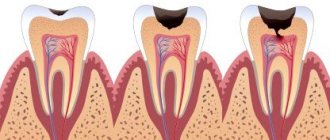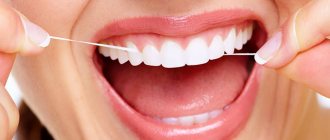The appearance of a rotten egg taste in the mouth indicates the presence of some pathological process occurring in the body .
In some cases, this phenomenon is a symptom of a serious and dangerous disease that requires immediate treatment.
To understand why the taste of eggs appeared in the mouth, you need to familiarize yourself with the mechanism of development of the pathological condition.
You need to know the accompanying symptoms and possible pathologies that provoke the uncomfortable symptom.
Causes of bad breath
Halitosis occurs when the exhaled air contains volatile compounds with an unpleasant odor. Their sources can be 1,2,3,4,6:
- some food products (garlic, onions, cabbage);
- products of carbohydrate fermentation (fermentation);
- decaying food debris;
- waste products of bacteria.
However, the main cause of bad breath is the production of hydrogen sulfide by anaerobic bacteria in the mouth. Their peculiarity is their ability to live without oxygen and in places that are difficult to reach with a toothbrush, for example, on the back surface of the tongue and the back wall of the pharynx, between the teeth, in gum pockets, on the tonsils, in the natural grooves of the teeth1,2,3.
to come back to the beginning
Risk factors
Factors that promote the growth of oral bacteria can cause halitosis. They are conventionally divided into local and general1.
In 80-90% of cases, halitosis is found to be caused by one of the following reasons1,2,3,4,6:
- caries and its complications;
- inflammation in the periodontium;
- diseases of the oral mucosa;
- poor hygiene, especially poor cleaning of teeth, tongue, orthopedic and orthodontic devices (prostheses or braces) - neglect of oral care leads to the accumulation of food debris, which is food for microbes, between the teeth, near the gums, on the back of the tongue, on the elements of the device ;
- deficiency of saliva with xerostomia or “dry mouth syndrome” - with a decrease in salivation, the natural cleansing of the oral cavity is disrupted and favorable conditions are created for the proliferation of microbes.
If local causes of halitosis are associated with the oral cavity, then general ones are associated with the condition of the whole organism1,2. But indirectly, general factors can influence oral health by promoting mucosal dryness and bacterial growth1,2.
Thus, the following factors can contribute to the proliferation of bacteria and the appearance of bad breath:
- Nutritional features. Eating large amounts of protein (meat, fish), coffee, carbonated drinks (sweetened with sweeteners) and alcohol promotes the growth of bacteria that produce “fragrant” volatile compounds1,2,3.
- Smoking. Although nicotine and tobacco combustion products have an unpleasant odor, this is not the only cause of halitosis in smokers. Due to smoking, the oral mucosa becomes dry, the number of bacteria on it increases, and inflammatory processes in the periodontium may occur1,2,3. All this contributes to the appearance of bad breath.
- Hormonal changes. Women may experience bad breath during menstruation. “Menstrual breathing” occurs due to fluctuations in the level of hormones that affect the properties of saliva, making it more viscous2. In addition, stress hormones can influence the growth of oral bacteria that produce volatile compounds2.
- Some medications , such as antibiotics and hormones (glucocorticosteroids), reduce saliva production, which promotes the growth of anaerobic bacteria3.
to come back to the beginning
Causes of the smell of rotten fish or meat from the mouth and how to get rid of them
Sometimes a person’s breath smells like rotten meat, which in most cases is a clear symptom of serious liver damage, for example, chronic hepatitis B or C, acute hepatitis A, cirrhosis or other pathologies of this organ.
Associated symptoms:
- Yellowing of the sclera, mucous membranes and skin in varying degrees of intensity;
- Significant darkening of urine;
- Severe discoloration of stool;
- A feeling of heaviness in the liver area and an increase in its size;
- Sometimes pain may also occur.
If you have a rotten meat smell or taste in your mouth, you should urgently visit a gastroenterologist or at least a therapist who will conduct an examination, study your medical history and symptoms, and, if necessary, prescribe a full examination. It is important to remember that these symptoms may be the result of hepatitis A, which is a serious viral infection that is very easily transmitted to other people.
The appearance of a fishy odor from the mouth almost always indicates the presence of various metabolic disorders in a chronic form, for example, a disease such as trimethylaminuria.
An important point is that with trimethylaminuria, the smell of spoiled fish from the mouth appears not only from the oral cavity, but also from urine, as well as from sweat.
The disease is very rare, occurring due to a special hereditary liver disorder, when the organ is unable to break down trimethylamine N-oxide due to insufficient synthesis of the necessary enzyme. The disease occurs due to a gene disorder that can be passed on to the child from either parent, but not all carriers exhibit the disorder. It is noteworthy that the older generations of the patient very often do not know about the presence of this gene disorder.
In isolated cases, such a pathology may be acquired. As a rule, the onset of the disease is provoked by frequent consumption of food containing large amounts of elements such as carnitine, choline and lecithin, contained in foods such as liver, fish, wheat germ, chicken eggs, kidneys.
Symptoms of the disease, as well as the smell of rotten fish from the mouth, can also occur with long-term use of certain nutritional supplements used by athletes to increase endurance.
If a person detects a taste or smell of spoiled meat or fish in his mouth, this is a cause for serious concern and urgent consultation with a doctor. It is important to remember that such manifestations in most cases indicate the presence of diseases, and therefore any home methods for eliminating such an odor will only mask it for a short time.
How does halitosis manifest?
Constant bad breath is one of the symptoms of periodontal disease2. With physiological halitosis, when there are no dental or general diseases, the unpleasant odor is a temporary phenomenon. It appears after eating specific foods (onions, garlic) and disappears some time after eating and brushing teeth6. If you notice bad breath in the morning or after intense physical activity, it is likely that you are not producing enough saliva or it is drying up quickly due to breathing through your mouth at night or during exercise6.
to come back to the beginning
Symptomatic therapy
If rotten belching is caused by enzymatic deficiency, to eliminate the unpleasant sensations, it is necessary to correct the diet with the exclusion of milk, fresh fruits, bread and other provoking foods. To reduce the frequency of regurgitation, it is recommended to avoid bending over and heavy physical work immediately after eating. To cope with the reflux of rotten gases at night, it is useful to sleep on a high pillow. To reduce belching before verifying the diagnosis, you can use enzyme preparations and prokinetics. Laxatives and cleansing enemas help with constipation.
Treatment
Often a person tries to get rid of bad breath on his own - using refreshing sprays or chewing gum. But this approach does not eliminate the causes and acts temporarily - complete disappearance of the unpleasant odor can only be achieved under the supervision of a doctor, who will determine the causes and select individual treatment2,5.
If halitosis is confirmed by tests performed by a doctor, it is considered true. But sometimes a person is sure that his breath is bad, although those around him do not smell anything. Doctors refer to this condition as false halitosis or pseudohalitosis1,3.
As a rule, people with bad breath should first consult a dentist1. For physiological halitosis, proper oral care is taught, including brushing the teeth and tongue1,4,6. If the problem of bad breath lies in dental diseases, then the doctor1.6:
— carries out professional hygiene — removes dental plaque;
- eliminates foci of infection - treats or removes decayed teeth, cleans periodontal pockets;
— prescribes therapy aimed at restoring saliva deficiency;
— in case of inflammatory processes, prescribes drug treatment.
to come back to the beginning
How to eliminate “aroma” during fasting?
- Drink as much water as possible (at least 2 liters per day). The liquid can speed up metabolic processes in the body, and it will also “wash away” bacteria in the mouth, thereby reducing the volume of unpleasant-smelling waste products.
- Use lozenges, flavored sprays and chewing gum. Scented products can muffle the repulsive trail, but in no case eliminate it. It is important to note that it is better to choose these products with any flavor other than mint: oddly enough, it is mint that will aggravate the unpleasant odor.
- Maintain oral hygiene regularly: toothpaste, mouthwash, dental floss are faithful helpers in the fight against halitosis. You need to brush your teeth and rinse your mouth at least 2 times a day, not forgetting about your tongue, but you can use dental floss after every meal.
It’s a good idea to rinse your mouth with plain water or a weak soda solution every time after eating (3 times a day).
- Do a liver cleanse using hepatoprotective agents. To avoid possible complications or adverse reactions, such activities should only occur after consultation with a doctor. Perhaps he will prescribe a series of diagnostic procedures in order to make an accurate diagnosis and determine the advisability of using these medications. You can also use sorbents:
- "Polyphepan".
- "Enterosgel".
- "Activated carbon".
- You can use a pharmaceutical remedy for the unpleasant “amber” - the Septogal pill, which, among other things, also acts as an antiseptic. It is enough to dissolve 2 tablets 4 times a day - and you can forget about the problem.
- Apples will help in this unpleasant situation : in the morning after rinsing your mouth, it is recommended to eat 1 - 2 apples. The iron contained in them activates the process of fat breakdown.
- Some foods can help fight halitosis:
- Greens (parsley, spinach, lettuce, basil, cilantro, rosemary, mint).
- Coffee beans, cardamom, cloves, cinnamon, coriander.
- Any nuts.
- Dried fruits (prunes, dried apricots).
- Pickled or fresh ginger.
- Milk and dairy products.
- Green tea, coffee.
Metrogyl Denta® for inflammatory diseases of the oral cavity accompanied by halitosis
Since one of the causes of bad breath is inflammatory periodontal diseases2, one of the directions of therapy should be the treatment of inflammatory diseases of the oral cavity.
Dental gel Metrogyl Denta® is a drug that can be used for the treatment and prevention of most infectious and inflammatory diseases of the oral cavity, in particular gingivitis and periodontitis7. It contains two active antimicrobial components - the antibiotic metronidazole and the antiseptic chlorhexidine, which are effective against the main anaerobic bacteria that cause periodontal diseases7.
to come back to the beginning
Prevention methods
To avoid the occurrence of halitosis, it is recommended6:
- Reduce the amount of dental plaque. It is important to promptly clean teeth, dorsum of tongue, dentures and braces from bacteria and accumulated food. To do this, you need to use not only a toothbrush, but also dental floss, brushes and mouthwash.
- Balance your diet - limit your intake of carbohydrates (sweets), which oral bacteria use as nutrients.
- Fight bad habits - limit the number of cigarettes you smoke or give up smoking completely, drink less coffee and alcoholic beverages.
- Increase your fluid intake - this makes saliva production easier.
Bad breath should not lead to problems in communication, especially since it is not difficult to deal with. Professional teeth cleaning, treatment of periodontal diseases and careful personal oral hygiene help get rid of halitosis in 80.7% of patients. Therefore, the right decision would be to make an appointment with the dentist as soon as you notice bad breath. If symptoms persist after eliminating dental causes, you should seek help from a therapist1,5,6.
What else can cause bad breath?
Bad breath is not always associated with problems in the oral cavity. It may be related to a person's lifestyle. For example, heavy smokers and “fans” of alcohol can be easily recognized by the specific odor from their breath. Bad breath can also be a syndrome of diseases of various organs and systems of the body.
What diseases cause bad breath?
Bad breath can occur when:
- Diseases of the ENT organs;
- Liver cirrhosis;
- Bronchitis, pneumonia, other diseases of the bronchopulmonary system;
- Severe kidney pathologies;
- Diseases of the gastrointestinal tract - gastroesophageal reflux, ulcers, etc.;
- Lactose intolerance, gluten intolerance and many other diseases.
Which doctors should you contact if you have bad breath?
Since halitosis is most often associated with dental reasons, you should first contact an experienced dentist. For example, at the first consultation, our clinic’s specialists will conduct a diagnosis and determine whether the problem is related to diseases of the oral cavity, and will give recommendations on how to solve it.
If it turns out that everything is in order regarding dentistry, you need to contact a therapist. After an examination and study of the medical history, he will give a referral to the appropriate doctor - otolaryngologist, gastroenterologist, endocrinologist, psychologist or other specialized specialist.
Bibliography
- Khitrov V. Yu., Zabolotny A. I. Halitosis - a medical and social problem // Practical medicine. - 2009. - No. 1 (33). — P. 12-17
- Gorobets S. M. et al. Risk factors for the development of halitosis (review) // Crimean Therapeutic Journal. — 2022. — No. 3. — P. 13-18
- Maksimova E.V., Stetsyuk N.S., Shelikhova E.O. Halitosis as a medical and social problem // Crimean Therapeutic Journal. — 2020. — No. 1. — P. 32-37
- Temkin E. S., Churikova A. S. Halitosis - modern diagnostic methods and their prospects // Volgograd Medical Scientific Journal. — 2022. — No. 3. — P. 15-18
- Vinogradova T. G. Bad breath - halitosis, causes and treatment options // Bulletin of VSMU. - 2014. - T. 13. - No. 2. - P. 129-131
- Ushakov R.V. et al. Modern methods of diagnosis, elimination and prevention of halitosis // Textbook: Moscow. - 2016. - 81 p.
- Instructions for the medical use of the drug Metrogyl Denta® Dental gel // Registration number P N015982/01 // State Register of the Russian Federation. – URL: https://grls.rosminzdrav.ru/Grls_View_v2.aspx?routingGuid=9bc9a05c-d28b-473d-b8d4-60e8b8323762&t=
Modern aspects of the prevention of diseases of the oral mucosa in patients with xerostomia / L.D. Weisheim, L.M. Gavrikova, T.N. Gomenyuk, T.V. Motorkina, L.N. Shcherbakov, S.M. Dubacheva, G.V. Sorokoumova//Medicinal Bulletin.—2013.—No. 2 (50). -WITH. 32-37.
Bad breath, also known as halitosis, is defined as “unpleasant odors coming from the mouth or air-filled cavities such as the nose, sinuses, and throat.” In 90% of cases, the smell comes only from the oral cavity.
Is bad breath normal during pregnancy?
Bad breath is common during pregnancy and usually occurs as a result of changes occurring in the body. Halitosis is caused by volatile sulfur compounds, which are hydrogen sulfide and methyl mercaptan and are produced by bacteria in the mouth.
What Causes Bad Breath During Pregnancy?
Below are common causes that can cause the development of volatile sulfur compounds and ultimately bad breath during pregnancy.
- Hormonal changes: As a result of increased hormone levels in the body, the mouth becomes an ideal breeding ground for plaque. Increased amounts of estrogen and progesterone can worsen the gums' reaction to plaque and cause gingivitis, or gum inflammation. Swollen gums have pockets where food gets stuck and causes an unpleasant odor. Plaque can be reduced through good hygiene.
- Vomiting: Nausea and vomiting are familiar to 66% of pregnant women. Frequent vomiting leads to the creation of an acidic environment in the mouth and subsequent demineralization of the teeth. As a result, they are prone to food getting stuck and rotting, which can cause an unpleasant odor.
- Calcium deficiency: The baby in the womb absorbs calcium from calcium deposits in the mother's body. A lack of vitamin in a woman’s blood leads to the leaching of minerals from bones and teeth. As a result, teeth become weaker and susceptible to tooth decay.
- Dehydration: It is recommended to drink more water during pregnancy to compensate for fluid loss due to vomiting or excess urination. Drinking less water can cause dehydration and dry mouth, which can cause bad odor.
- Lifestyle changes: Pregnancy causes hunger pangs in many women. Frequent snacking and eating at night can cause bad breath. Moreover, due to specific tastes, during an interesting situation, many people prefer sweet or unhealthy foods.
- Slow digestion: Digestion is usually disrupted during pregnancy due to the enlargement of the uterus and hormonal changes, which can cause acid reflux. This in turn leads to demineralization of the enamel, the formation of craters in the teeth and subsequent deposition of food.
- Reduced salivation: Saliva has a self-cleaning effect on the teeth. It washes away food debris from the grooves of teeth and keeps your mouth clean. Some studies have proven that salivation decreases during pregnancy, which may increase the likelihood of bad breath.
- Food: Food containing strong flavored ingredients such as garlic, onion, coffee, etc. can also cause bad breath.
- Medical conditions: Respiratory, ear, nose and throat infections, diabetes, liver problems, gastrointestinal and endocrine diseases can also cause bad breath.
The above conditions can lead to a wide range of dental problems, which can ultimately cause bad breath. In most cases, this condition occurs mainly due to inflammation of the gums (known as gingivitis).
It is important to note that pregnancy itself has little effect on the occurrence of gingivitis or periodontitis. Most often, plaque is already present in the mouth, so women planning pregnancy are advised to brush their teeth regularly.
Associated symptoms of bad breath (halitosis)
Sometimes you may not realize that you have bad breath, but the accompanying signs will not go unnoticed, namely:
- red, swollen, and bleeding gums;
- dry mouth or decreased salivation;
- coated tongue;
- unpleasant metallic or bitter taste in the mouth.
How to avoid bad breath during pregnancy?
Treating bad breath does not always require medical intervention. Sometimes you can cope with simple methods:
- Brush your teeth twice a day.
- Floss your teeth daily to prevent food particles from getting stuck between your teeth.
- Clean your tongue as it protects bacteria that can cause bad breath.
- Use warm salt water or non-alcoholic mouthwash to rinse your mouth after meals.
- Avoid foods with strong odors or brush your teeth after eating such foods.
- Eat foods rich in fiber because it has a self-cleaning effect on soft plaque and also helps improve digestion.
- Drink plenty of water as this will help in preventing dry mouth and resulting bad breath.
- You can also use sugar-free gum to get rid of the odor. Chewing gum also increases salivation.
- Calcium supplements help maintain optimal calcium levels in the blood.
- Get regular dental checkups, which are usually recommended every six months.
When should you see a doctor?
Experts usually recommend a professional teeth cleaning and polishing session during the second trimester, even if there are no dental problems.
Do not delay going to the dentist if you have the following problems:
- bad breath;
- bleeding gums;
- any mobile (loose) teeth;
- sore teeth or gums;
- burning sensation in the mouth
- metallic taste in the mouth;
- food deposits between teeth and gums;
- discharge of pus from the gums;
- a shiny red lump on the gum that looks like a raspberry. This may indicate the presence of pyogenic granuloma, a gum infection that occurs in 5% of all pregnancies.
Diagnosis of bad breath
A dentist will help determine the cause of bad breath using the following methods:
- Sensory measurement: This method measures the air exhaled by the patient through the nose. This is the most common method for diagnosing halitosis.
- Gas chromatography: This is considered a very reliable way to diagnose halitosis. Gas chromatography is used to measure volatile sulfur compounds.
- Sulfide Monitoring: Sulfide monitoring is a relatively inexpensive way to measure volatile sulfur compounds. It detects the electrochemical reaction of sulfur-containing compounds in exhaled air on a sulfide monitoring device.
- Chemical Sensors: These sensors have a built-in probe that helps measure wax compounds from the tongue and gum pockets. This sensor generates an electrochemical voltage that is detected by an electronic device.
- Ban test: A strip consisting of benzoyl-DL-arginine-A-naphthylamide is used to detect microorganisms that cause bad breath.
A few more tests that may be performed by your dentist:
- quantitative assessment of β-galactosidase activity;
- saliva incubation test;
- ammonia monitoring;
- method for producing ninhydrin.
In most cases, malodor during pregnancy resolves with basic treatment protocols such as teeth polishing, and these tests may not be necessary.
Is it possible to remove bad breath during pregnancy using medical procedures?
The dentist may prescribe one of the following procedures;
- deep exfoliation and root planing to remove plaque on the teeth and under the gums;
- resin fillings for teeth that have worn down due to acid reflux or vomiting;
- curettage in case of large deposits of plaque under the gums;
- surgical or laser removal of purulent granuloma.
FAQ
1. Does pregnancy cause bad breath?
Pregnancy itself may not cause bad breath, but morning sickness, acid reflux, food cravings and frequent snacking typical of an interesting position can provoke an unpleasant odor.
2. Is bad breath a sign of pregnancy?
The sense of smell increases during pregnancy. As a result, a woman may become more sensitive to the existing aroma from her mouth. However, an unpleasant odor in itself cannot be considered a sign of pregnancy.
References:
- Diana V. Messadi and Fariba S. Younai, Halitosis; Dermatologic Clinics Journal
- Bahadır Ugur Aylikci and Hakan Colak, Halitosis: From diagnosis to management; Journal of Natural Science, Biology and Medicine
- Albert Tangerman and Edwin G. Winkel, Volatile Sulfur Compounds as The Cause of Bad Breath: A Review; Journal of Phosphorus, Sulfur, and Silicon and the Related Elements
- Mustafa Naseem et al., Oral health challenges in pregnant women: Recommendations for dental care professionals; The Saudi Journal for Dental Research
- Supawadee Naorungroj, Jaranya Hunsrisakhun and Supitcha Talungchit, Oral hygiene status, self-reported oral malodor, oral hygiene practices, and oral health knowledge: A cross-sectional study in a group of Muslim Thai pregnant women; Journal of International Oral health
- Min Wu, Shao-Wu Chen, and Shao-Yun Jiang, Relationship between Gingival Inflammation and Pregnancy; Mediators of Inflammation
- Hemalatha VT et al, Dental Considerations in Pregnancy-A Critical Review on the Oral Care; Journal of Clinical and Diagnostic Research
- Abdulrahman Almaghamsi, Mussa H. Almalki and Badurudeen Mahmood Buhary, Hypocalcemia in Pregnancy: A Clinical Review Update; Oman Medical Journal
- Amruta A Karnik et al, Determination of salivary flow rate, pH, and dental caries during pregnancy: A study; Journal of Indian Academy of Oral Medicine and Radiology
- E. Leslie Cameron, Pregnancy and olfaction: a review; Frontiers in Psychology










